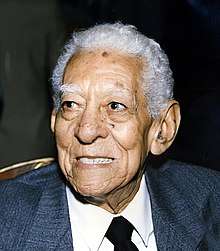Luis Beltrán Prieto Figueroa
Luis Beltrán Prieto Figueroa (14 March 1902 – 22 April 1993), was a Venezuelan politician. A founder of Democratic Action and Minister of Education in its first government (1947–1948), he was a leader of Democratic Action after the restoration of democracy in 1958. He split from Democratic Action in 1967 when it tried to prevent his victory in district-level primary elections for the 1968 presidential race translating into Prieto Figueroa winning the nomination. He and a substantial group of supporters split from AD and founded the People's Electoral Movement, which he led until his death.[1]
Luis Beltrán Prieto Figueroa | |
|---|---|
 | |
| President of the Senate of Venezuela | |
| In office 1962–1967 | |
| President | Rómulo Betancourt Raúl Leoni |
| Preceded by | Raúl Leoni |
| Succeeded by | Luis Augusto Dubuc |
| Personal details | |
| Born | 14 March 1902 La Asunción, Nueva Esparta |
| Died | 22 April 1993 (aged 91) Caracas, Venezuela |
| Nationality | Venezuelan |
| Political party | Democratic Action, People's Electoral Movement |
| Profession | politician |
| Signature |  |
Career
After completing a doctorate in political and social sciences at the Central University of Venezuela (1934),[1] he became engaged in politics, and was a senator from 1936 to 1941.[1] He was a founding member of party Acción Democrática (AD, Democratic Action), and Minister of Education under Rómulo Gallegos (1947-8).[1] After the 1948 coup he went into exile, working for UNESCO in Costa Rica and Honduras (1951-8), after a professorship at the University of Havana (1950-1).[1] Returning from exile after the end of the dictatorship of Marcos Pérez Jiménez in 1958, he was again elected senator (1959–1969).[1] During this time he was Secretary General of AD (1958-9), President of the Venezuelan Senate from 1962 to 1967,[2] and President of AD (1963–67).[1]
In 1967 Prieto Figueroa campaigned to be the party's presidential candidate for the 1968 Venezuelan presidential election; a Democratic Action convention was to be held in September 1967 which would choose the candidate. Previous practice had been for convention members to be chosen by a process where local party committees chose representatives for state conventions, and these chose state representatives for the national convention.[3] However in spring 1967 the party decided to hold primary elections at local level, with district representatives to district conventions elected by the mass membership instead of party committees.[3] The Romulo Betancourt faction supported Gonzalo Barrios, considering Prieto too far left,[4] but Prieto won between 65 and 75% of the local primaries. In response the national party began selectively holding district conventions in areas expected to yield pro-Barrios delegates; but these too came out for Prieto, "and made his victory at the national convention virtually inevitable. The only way the [Barrios faction could win] was to play dirty in the rest of the nomination process, and it was these tactics that provoked the split."[5] Prieto Figueroa split from AD over the affair along with a substantial number of his supporters, founding the People's Electoral Movement.[4] As its candidate in the 1968 election he gained nearly 20% of the vote, coming fourth in a close election (COPEI's Rafael Caldera won with 29%). However Prieto's subsequent electoral run, in the 1978 Venezuelan presidential election (the party endorsed Jesús Ángel Paz Galarraga in 1973), achieved only just over 1%.
Books
- Las ideas no se degüellan (1980)
- Pido la palabra (1982)
- Mi hermana María Secundina y otras escrituras (1984)
References
- (in Spanish) Biography at Venezuelatuya.com
- Sereno, Herminia Cristina Méndez (January 1997). "5 siglos de historia de Venezuela: Desde 1492 hasta 1996 : Guía para estudiantes".
- Powell, John Duncan (1971), Political mobilization of the Venezuelan peasant, Harvard University Press. p206-7
- David L. Swanson, Paolo Mancini (1996), Politics, media, and modern democracy: an international study of innovations in electoral campaigning and their consequences, Greenwood Publishing Group. p244
- Coppedge, Michael (1997), Strong Parties and Lame Ducks: Presidential Partyarchy and Factionalism in Venezuela, Stanford University Press, pp126-7
La magia de los libros - Written while living in Costa Rica when he was exiled from Venezuela in 1952/53
External links
- (in Spanish) Biography at Venezuelatuya.com